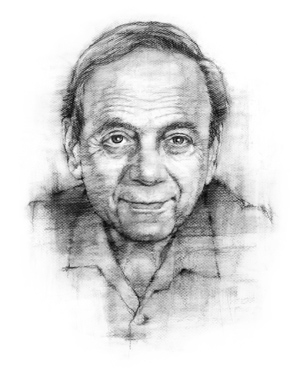|
||
      |
Talking points
NAME: Donald N. Levine
 TITLE: Peter B. Ritzma professor in sociology and the College
TITLE: Peter B. Ritzma professor in sociology and the College
CHICAGO DEGREES: AB’50, AM’54, PhD’57
AREAS OF EXPERTISE: Classical social theory, modernization theory, Ethiopian studies, conflict theory and aikido, philosophies of liberal education
LOCAL CLAIM TO FAME: As dean of the College, in 1983 Levine began the annual winter festival Kuviasungnerk, including the early-morning Kangeiko exercises, intended to both inject fun into winter and expose more students to the martial arts.
LATEST BOOK: Powers of the Mind: The Reinvention of Liberal Learning in America, University of Chicago Press, 2006
AUTHORIAL INSPIRATION: Allan Bloom’s (PhB’49, AM’53, PhD’55) best-selling Closing of the American Mind of 1987 got me going. I disliked Bloom’s prescriptions and felt angry about how widely his account was taken to be a portrayal of the Hutchins College curriculum. I resolved to write a book that did justice to the U of C College.
As the book evolved over 15 years, other matters caught my attention. I hated the way discourse about education was monopolized by the so-called culture wars; those issues were political, not educational. I grew alarmed by how educational leaders were fixated on physical resources and how commercial and consumerist pressures were distorting academic values. And I came to expand my views of liberal learning by bringing awareness of the body and the emotions into educational thought.
WHY EDUCATION NEEDS REINVENTING: Liberal education is always being reinvented—that’s been true for more than two millennia. In our times we have first to rescue the whole enterprise from being drowned by pressures of commercialism, consumerism, high-tech mindlessness, and the like. Then we have to face up to the novel circumstances and resources in which human powers can be defined and nourished. In that process the colossal changes brought by what I call the “modernity revolutions” need to be addressed.
TECHNOLOGICAL AIDS: New technologies offer blessings and curses. The curses include temptations for distraction, mindless manipulation, and plagiarism. The blessings include economizing the time needed to take care of drudge work, facilitating open exploration of questions, and bringing many kinds of voices and perspectives to any conversation.
CONTESTED PRINCIPLES AND TEACHING POWERS: Even if there is agreement that higher learning should include teaching geared to cultivating the person and not solely to training for jobs, aims can be pursued in radically different ways. These include a focus on the character of the learner, the world to be known, a common heritage, or kinds of disciplines. The University experimented with all four and eventually settled on the last, which I refer to as “teaching powers.”
The notion has deep roots in Chicago tradition. It goes back to William Rainey Harper, to John Dewey, to the amazing Wilkins Committee Report of the 1920s, to Robert M. Hutchins, and to the teachings of Richard McKeon, Joseph Schwab, PhB’30, SM’36, PhD’38, and Robert Redfield, PhB’20, JD’21, PhD’28—the figures most celebrated in my book. The nub of the notion involves a redefinition of discipline.
DISCIPLINE DEFINED: When we talk about disciplines, we tend to think in terms of subject matter: primate anatomy, linguistic structures, Romance literature, topology, ancient history. The rhetoric of powers presumes that disciplines be conceived in an older sense—as ways of training diverse human capacities. The conclusion of my book is that we desperately need to engage in conversations about the kind of human powers most worth cultivating in the 21st century.
Those include the power of communicating with persons trained in diverse specialties and holding diverse perspectives. The capacity to work with ambiguity productively in democratic discourse. The ability to cultivate authentic selves and to relate those selves to other, very different selves—openly, creatively. But even more important is the need for more people—not just professional educators—to engage in such conversations.
CLASSROOM STYLE: One thing I avoid is letting students use clichés instead of arguments. I lecture only when there is something to say that is not already published. The point is to engage their minds in a process of authentic thinking.
Beyond that, I emphasize conversation. I encourage students to interpret what authors are doing as a form of conversation and to en-gage in genuine dialogue with authors, with one another, with me. I encourage them to connect discussions of anything with larger issues—of history, the world, contemporary life, their own lives.
AIKIDO’S INFLUENCE: My emphasis on conversation has grown through practice of an art that, properly understood, is all about mutually respectful dialogue. And my suggestions for reshaping liberal education include a strong emphasis on body-mindfulness in the liberal curriculum of the future.
CONTINUING EDUCATION: After retiring in March, I want to spend more time promoting the disciplines of meaningful communication—through a book on what I call “dialogical social theory,” through engaging teachers in conversational pedagogies, through facilitating dialogues among Ethiopians of different political perspectives, and through spreading the use of aikido and its applications. I want to enjoy enriching communications with my family and friends. And after the first year off, I doubt I’ll be able to resist the temptation to teach at the University from time to time.